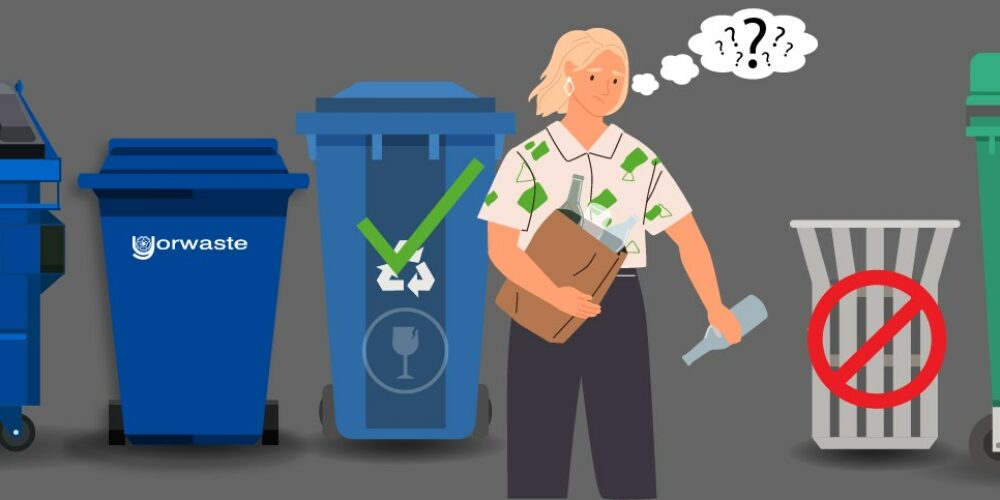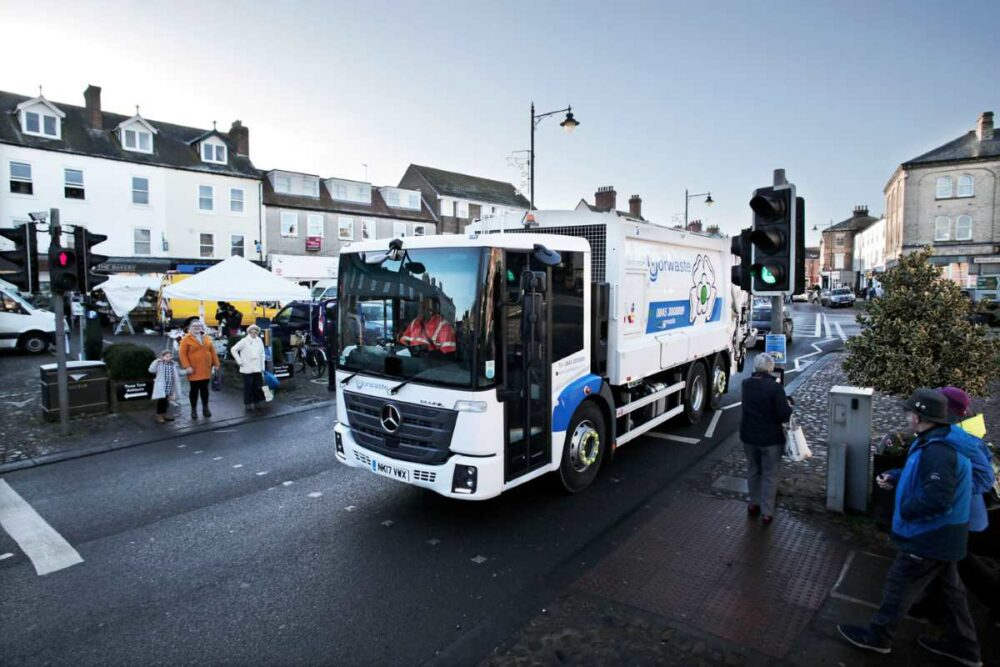Is the UK a waste contamination nation?

17%, or one-fifth, of all UK waste that’s collected and sent for reprocessing cannot be recycled due to contamination, according to historical WRAP data.
Contamination is caused by a number of poor recycling habits, such as items being placed in the wrong bins, recyclable waste that’s soiled with substances like food or chemicals, or miseducation about what can and cannot be reprocessed in the first place.
The problem with contamination
Contamination can cause issues on several levels, resulting in significant losses for businesses, local authorities and the planet.
-
It can result in otherwise recyclable materials ending in general waste
Despite the best efforts of recycling processors, it’s not feasible for a company that deals with a specific type of material, such as PHP plastic, paper or glass, to extract, sort and ship countless types of unwanted waste to other reprocessing companies.
-
Contamination of surrounding waste
Paper or cardboard containing the remains of food or liquids is unrecyclable, however, this type of waste often ends up in the recycling bin, spoiling otherwise clean materials and rendering them all unusable. Likewise, any item that’s been in contact with toxic or hazardous substances can infect the entire batch and expose recycling workers to unsafe conditions.
-
Damaging machinery
Equipment designed to sort certain waste streams may be required to halt or disentangle non-recyclables, causing delays and added expenses which recycling companies may struggle to recoup.
-
Degrading market value
Recycling waste is an important revenue stream for many local authorities. The councils that collect the waste take payment from reprocessors for batches of materials to pour back into the community it serves. The poorer the quality due to contamination, the lower the market value.
Why should businesses improve their recycling mindset?
-
Commercial benefits
The more contamination costs the reprocessing industry to deal with, the more these will be ultimately passed on to the customers using waste services. Waste is the second largest utility outlay for a business after energy, so it’s critical the waste eco-system works in synergy – from businesses disposing of waste, through to the collectors, sorters and reprocessors – to keep waste fees down.
-
Green benefits
Consumer demand and government regulations are driving ESG investment, and companies of all sizes are increasingly getting on board with a greener mindset. Good recycling is a perfect starting point, which can be easily achieved by companies using waste providers who can support a business’s recycling efforts with a wide range of bins, signage and a reliable service.
-
Positive company culture
Education is critical to ensure the overall workforce understands the importance of good recycling habits, why this is integral to the company’s culture, and what the business is prepared to do to help them recycle effectively. Staff incentives, regular updates and team feedback sessions are great ways to get teams onside with a strong recycling culture.
The most common commercial recycling streams:
- Dry mixed recycling: plastic bottles, drink cans, food tins, paper, magazines, card, cardboard
- Glass: from pubs, factories, retail industry, offices, restaurants and the manufacturing sector
- Wood by-products: branches from lumber-jacking and tree surgery, stumps from tree harvesting, timber from sawmills, furniture makers and paper manufacturers, broken pallets, timbers from the building trade
- Confidential waste: paper documents, computers, staff name badges and uniforms, CDs (all declassified before recycling)
- Food: unpackaged cooked and raw foods like sandwiches, fruit and vegetable peelings, meat, fish, bread, category three animal by-products intended for human or animal consumption, such as eggshells, hides and carcasses
- Liquids: a wide range of liquids, oil and waters
Specialist waste
It’s important that the above waste streams commonly used by businesses are not contaminated with the following, which can largely be disposed of via specialist waste services providers:
- Clinical waste
- Washroom waste
- Electrical goods
- Building and construction waste
- Hazardous waste such as:
- Automotive products, like motor oil, antifreeze, windshield wiper fluid, lead-acid batteries, brake fluid.
- Trade products, including paint, varnish, stain, paint thinner, paint stripper.
- Pesticides, like insecticide and insect repellent, weed killer, rat and mouse poison, disinfectant, wood preservative.
- Cleaning products, including drain unblocker, oven cleaner, bleach, ammonia.
- Other day-to-day commercial waste, such as batteries, lighter fluid, arts and crafts materials.
How to avoid contamination
- Use clear bin bags instead of black for dry mixed recycling to avoid mix-ups.
- If recyclable materials are soiled, they may not make the cut. Make sure rinseable items are free from food and other stains.
- Greasy pizza boxes and other food packaging are a no-no. They are non-recyclable and can contaminate other waste.
- Other paper items that cannot be recycled include tissues, paper towels, receipts, post-it notes, plastic-lined coffee cups, coated or foiled paper.
- Make sure bins are clearly labelled – to give waste the best possible chance of being recycled.
- Educate, educate, educate – discussions, signage, information. It all helps to drive healthy recycling habits.
- If in doubt, check. Contact your commercial waste provider or local council. Recycle Now has a handy recycle locator (for domestic waste) for things that may not be accepted in your usual bins by could still be recycled.
More and more materials are becoming recyclable, with reprocessing companies and educational institutions innovating every day. To avoid contamination, it’s important to take the time to understand what can and can’t be recycled and how this can be carried out.
The 5 Rs of waste management
At Yorwaste, we are committed to the 5 Rs of waste management, and work closely with our customers to promote general waste reduction. These are:
- Refuse
- Reduce
- Reuse
- Repurpose
- And finally, Recycle
Look out for our community initiatives, such as Reuse Santa and Get Re-Cycling, where we collaborate with local businesses, charities, authorities and individuals to reduce consumption and breathe new life into old things that local councils may not currently collect or recycle.
Talk to Yorwaste
Our impartial, friendly team of waste management experts are on hand to help any business plan its recycling strategy, from which bins and materials they need, to assistance with education and incentivising workforces. Feel free to get in touch anytime.

